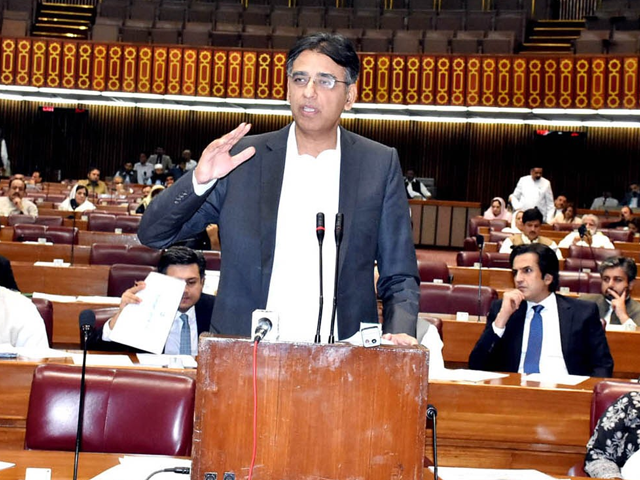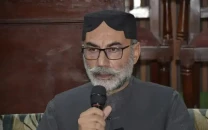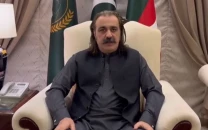PTI govt unveil Rs5.3tr revised ‘status quo’ budget
Asad Umar says govt has introduced steep fiscal adjustment of 2.1% of GDP, equal to Rs814 billion

Photo: SABAH
Presenting the Finance Supplementary (Amendment) Bill 2018 on Tuesday in the National Assembly, Finance Minister Asad Umar claimed that the mini-budget will help the economy teetering on the brink of collapse. He said the PTI government has introduced steep fiscal adjustment of 2.1% of Gross Domestic Product (GDP), which is equal to Rs814 billion.
As a result of this adjustment, the budget deficit that was projected to widen to Rs2.8 trillion or 7.2% of GDP would narrow down to Rs1.9 trillion or 5.1% of GDP, he said, adding that the budget deficit is as bad today as was in 2013, when the Pakistan Muslim League-Nawaz (PML-N) formed government.
The proposed Rs1.9 trillion or 5.1% of GDP budget deficit target is Rs89 billion higher than the original budget deficit target set by the last PML-N government for this fiscal year 2018-19.
After his budget speech, the minister said these are only emergency measures and the economic reforms will be introduced in coming weeks. He described “increasing employment, enhancing economic stability and supporting exports” as top priorities of his government.
However, the fiscal and expenditure measures that Umar unveiled do not fully reflect the PTI’s manifesto. He announced withdrawing tax-free perks of governors and federal ministers but could not dare touch the perquisites being availed by judges and generals.
Asad Umar rejects concessions for former Sindh governor
“It was a conscious decision to withdraw only those perks that are enjoyed by politicians who make decisions on the country’s tax policies,” said the minister, while addressing a press conference after his budget speech.
Instead of bringing any new sector or class of people in the tax net, the PTI government has increased the burden on the existing taxpayers. Umar did not scale back non-development expenditures but has cut the development budget, which will pull down the economic growth rate to a level that will not be sufficient to absorb new entrants in the job market.
The regulatory duties have also been increased or levied on 612 tariff lines. The sales tax on RLNG is increased. These fiscal adjustments can help Pakistan secure the International Monetary Fund (IMF) bailout programme, provided it decides to avail it to cope with the “grave external sector challenge”
Asad Umar did not announce new projected annual economic growth target but said it will be significantly lower than the PML-N’s announced target of 6.2%.
He reversed a major reform that the PML-N government had introduced to broaden the tax net. His government has permitted the non-filers of the income tax returns to buy cars and property, which the previous government had barred to force people to come in the tax net.
The minister also played with numbers and claimed that the actual development spending would be still higher than the last fiscal year. He told the National Assembly that for this fiscal year 2018-19, the public development spending will be Rs725 billion as against Rs661 billion in the last fiscal year.
However, the Rs661 billion was fully funded from the budget but the Rs725 billion includes Rs150 billion that is not part of the Public Sector Development Programme.
The minister said the National Highway Authority (NHA) would raise Rs100 billion off the budget to fund its projects while Karachi Infrastructure Development Company will also generate Rs50 billion through Public Private Partnership to finance Karachi projects.
Rationale for mini-budget
Umar said the mini budget had to be presented as the current budget was highly unrealistic. “The economic conditions can further deteriorate, if no corrective measures are taken. We are going to take big measures that will directly affect Pakistan’s affluent people,” he announced
But the minister supported the PML-N government’s policy of charging higher withholding tax rates for non-filers of income tax returns. He also allowed non-filers to purchase cars and properties, which is a serious setback to the efforts to broaden the documented economy.
Umar also unveiled tax amnesty for about 800,000 people who had been picked for audit due to their failure to file income tax returns. The withholding tax on banking transactions has been increased to 0.6% for the non-filers. The government also increased the tax burden of people earning more than Rs2.4 million annually.
Size of the new budget
The finance minister said the country is facing a severe economic crisis. If no measures were taken the budget deficit could shoot up to 7.2% of GDP or Rs2.9 trillion. This suggests that the budget size could have swelled to Rs6.1 trillion by end of this fiscal year as against Rs5.246 trillion announced by the last PML-N government.
He said the FBR’s revenues were facing Rs350 billion shortfall and the expenditures were overshooting by Rs250 billion. In addition to this, the provincial cash surplus of Rs286 billion was not expected in these circumstances. But against Rs350 billion shortfall, Umar announced only Rs183 billion worth new tax measures.
Despite Rs814 billion fiscal adjustment, the revised size of the budget will be Rs5.3 trillion – Rs63 billion or 1.2% higher than the original budget for this fiscal year. This is because the PTI government has increased the current expenditures budget to Rs4.4 trillion – an increase of Rs234 billion or 5.6% of the original budget of this fiscal.
The interest payments have been increased to whopping Rs1.842 trillion – an addition of Rs222 billion or 13.7% - after the central bank twice increased the interest rates. The interest payments will eat up 34.6% of the new revised budget. The pensions cost is also jacked up by Rs25 billion to Rs367 billion.
Despite austerity drive, the cost of running the civilian government has been reduced by only Rs3 billion to Rs460 billion. Contrary to increase in current budget, the PTI government has cut the development spending by Rs172 billion or 16.1% to Rs896 billion for this fiscal year.
It has introduced steep cut of Rs225 billion on the PSDP – lowering it from Rs800 billion to only Rs575 billion. But it has increased the other development expenditures by Rs54 billion to Rs234 billion due to its decision to give subsidies to exporters and on urea imports.
Revenues
The government has lowered the tax revenues target by Rs169 billion to Rs4.72 trillion – a reduction of 3.5% over this year’s original budget. It has cut the Federal Baird of Revenue’s (FBR) tax target by Rs37 billion to Rs4.398 trillion and other taxes target was also lowered by Rs132 billion to only Rs322 billion.
However, the government has increased the non-tax revenue target by Rs121 billion to Rs893 billion. The government’s net revenue receipts have been projected at almost original budget target level of Rs3.04 trillion after transfer of Rs2.6 trillion to provinces as their shares in federal taxes.
This has left the government with an overall budget deficit of Rs1.9 trillion or 5.1% of the GDP even after taking Rs286 billion cash surpluses.
External sector
The minister said the external sector situation was more serious, warning that the foreign currency reserves were slipping at an alarming rate. The import cover at present is less than two months, to be precise only for seven weeks. Rupee depreciation has hit the common man the most, he added.
PBC urges Asad Umar to focus on 'Make in Pakistan'
“We are at a crossroads and if the corrective measures were not taken the rupee could shed its value to an alarming level,” warned the finance minister. He said the 20% devaluation has already increased the cost of gas, electricity, petroleum products and cooking oil to name a few. “This has set alarm bells ringing,” said Umar while explaining gravity of the challenges at the external front.
He laid stress on pulling the country out of its debt burden and said it is the new government’s top priority. He said the public debt has already touched Rs28.3 trillion, excluding Rs2 trillion that are parked outside the budget.
“Improvement will not come from merely stabilisation measures or going to the IMF but it will come when there is employment, improvement in the agriculture sector and increase in exports.”
“But for everything to take effect, it will take time, and time is something we don’t have. Hence we have to take emergency measures,” he said.
Relief measures
The minister claimed that in order to improve the situation of the agriculture sector, the government has given Rs7 billion subsidy on imported urea in addition to providing gas to the local plants.
He said the Insaf health cards will be issued in Islamabad Capital Territory and defunct tribal areas to give up to Rs540,000 annual health insurance cover to each vulnerable family.
The minister said the prime minister has directed to release Rs4.5 billion for construction of 8,276 housing units for labourers. He said the decision to increase petroleum levy by three fold to Rs30 per litre has also been withdrawn. This will result into Rs110 billion cut in non-tax revenue estimates.
Umar said the government has lowered the cost of doing business by providing Rs44 billion relief to the five export oriented sectors. He also announced 10% increase in pensions of the Employees Old Age Benefit Institute (EOBI) pensioners.



















COMMENTS
Comments are moderated and generally will be posted if they are on-topic and not abusive.
For more information, please see our Comments FAQ